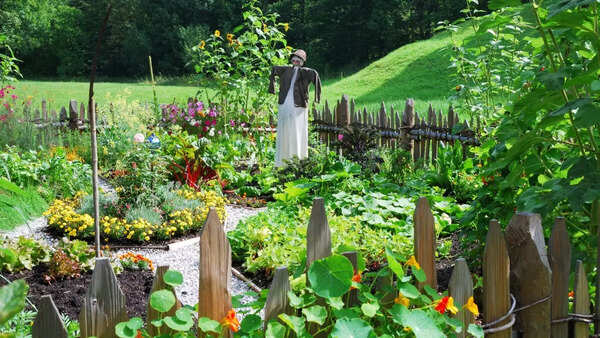The monsoon season breathes life back into the earth, offering respite from the summer's heat. For gardeners, it's an ideal time to cultivate a kitchen garden. Abundant rainwater, softened soil, and moderate temperatures create a nurturing environment for plants to flourish. Whether you are an experienced gardener or just starting, the monsoon provides a golden opportunity to grow your own food.
The rains revitalize the soil, fostering lush greenery, crisp vegetables, and vibrant flowers. Gardening during the monsoon connects you with nature, offering the satisfaction of nurturing life.

The monsoon season offers unique advantages:
However, ensure proper drainage to avoid waterlogging.

Here’s a practical guide to get you started:

Monsoon rains naturally soften the soil, making it easier to work with. Enhance fertility by mixing in organic compost, farmyard manure, or leaf mold. These materials decompose quickly in moist conditions, releasing vital nutrients like nitrogen, phosphorus, and potassium. Consider natural additives such as neem cake or bone meal for added nutrition and pest resistance. Before planting, test soil drainage; water should absorb within 2-4 hours. For clay-heavy soil, add cocopeat or coarse sand to improve aeration and prevent waterlogging.
Newer articles
Older articles
 The 'Good Cop, Bad Cop' Parenting Strategy: Does It Do More Harm Than Good?
The 'Good Cop, Bad Cop' Parenting Strategy: Does It Do More Harm Than Good?
 5 Natural Ways to Strengthen Your Heart and Reduce Disease Risk
5 Natural Ways to Strengthen Your Heart and Reduce Disease Risk
 Broadside: Broad Slams India's Team Choices After Headingley Test, Calls for Edgbaston XI Changes
Broadside: Broad Slams India's Team Choices After Headingley Test, Calls for Edgbaston XI Changes
 Wimbledon Serves Up India: Tennis Giant Courts Cricket-Crazy Nation for Growth
Wimbledon Serves Up India: Tennis Giant Courts Cricket-Crazy Nation for Growth
 England's Ben Duckett: The New Virender Sehwag? Former Coach Draws Bold Comparison
England's Ben Duckett: The New Virender Sehwag? Former Coach Draws Bold Comparison
 Archer Set for England Return? Broad and Buttler Advocate for Pacer's Second Test Inclusion
Archer Set for England Return? Broad and Buttler Advocate for Pacer's Second Test Inclusion
 Ashada Gupt Navratri 2025: Unveiling Dates, Timings, and Esoteric Significance
Ashada Gupt Navratri 2025: Unveiling Dates, Timings, and Esoteric Significance
 Suryakumar Yadav's Sports Hernia Surgery: What It Is, Who's at Risk, and Path to Recovery
Suryakumar Yadav's Sports Hernia Surgery: What It Is, Who's at Risk, and Path to Recovery
 The Evil Eye: Protective Charm or Portal to Darkness? Exploring the Symbol's Dual Interpretations
The Evil Eye: Protective Charm or Portal to Darkness? Exploring the Symbol's Dual Interpretations
 Jaiswal Eyes Gavaskar's 49-Year Record: India's Opener Nears Milestone 2,000 Test Runs in Edgbaston Clash
Jaiswal Eyes Gavaskar's 49-Year Record: India's Opener Nears Milestone 2,000 Test Runs in Edgbaston Clash